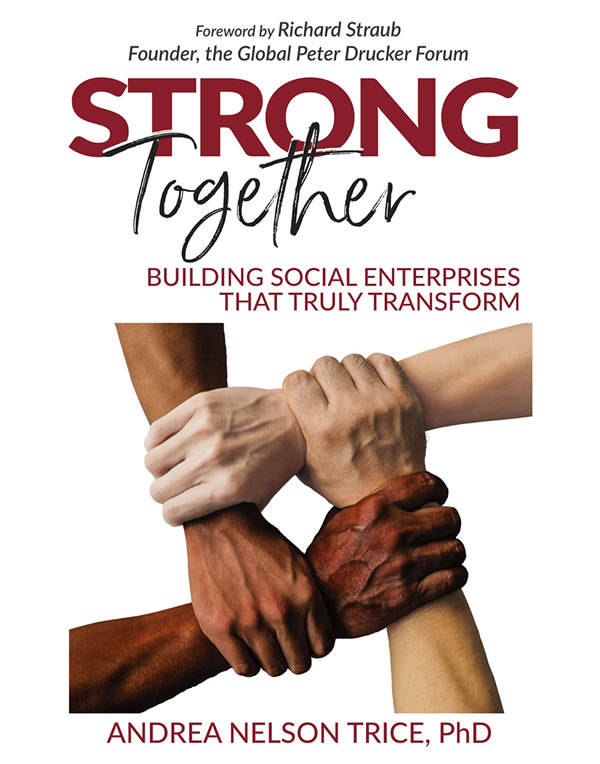 Strong Together making friends across the world
Strong Together making friends across the world
Andrea Nelson Trice’s book, Strong Together, researches and promotes best practice on relations between, on one hand, purse-holders and power-holders, and, on the other hand, recipients and subsidiaries.
Distilled from her experience of identifying and addressing the hidden cultural problems that can ruin the best-laid projects, the book is winning friends across the globe, after collecting a Silver Medal in this year’s Illumination Book awards.
Roxanne Addink de Graaf, Director of Strategy and Impact at Partners Worldwide, Grand Rapids, Michigan, USA, writes: “Strong Together is a vital resource for development practitioners, social entrepreneurs, impact investors, and anyone studying or engaged in cross-cultural teams, businesses or partnerships who wants to work together for sustained impact. Its insights can help build restorative relationships that bridge divides, in the US and across the globe. This is a book that everyone involved in business enterprises across cultures should read.”
“Do we care if Journalism dies?”
That is the challenge thrown down by the book, Saving Journalism, by Dr. Jenny M. Taylor
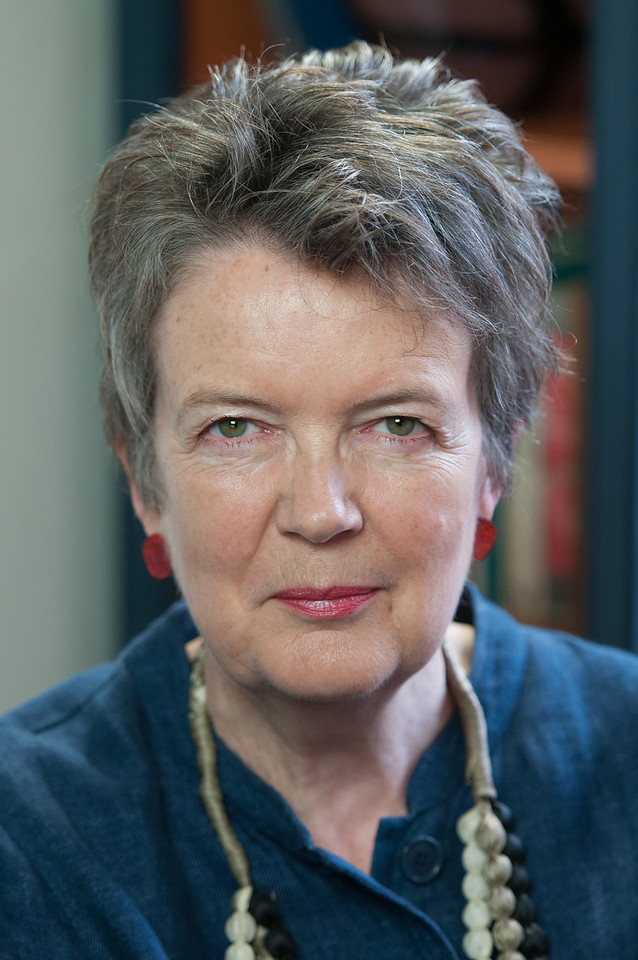 As she watches the lingering death of once-noble scribes being torn to pieces in the internet arena by Populist Politicians and Big Business, their newspapers thrown daily to the lions, Dr. Taylor still manages a cautious thumbs-up.
As she watches the lingering death of once-noble scribes being torn to pieces in the internet arena by Populist Politicians and Big Business, their newspapers thrown daily to the lions, Dr. Taylor still manages a cautious thumbs-up.
But she is no languid Caesar: with scholarship and energy which are hard to fault, she traces the growth of what she sees as an almost-priestly calling right back to the Old Testament when, she argues, the prophets of old were the first people to talk about concepts like statehood, human identity and moral responsibility, as they stood their ground between Jehovah and his rebellious subjects.
If so, do we, today, really need the spiritual descendants of these prophets – i.e., investigative journalists? Or are the affairs of pimps and rock stars enough to fill the gap between weather reports and oil prices?
Taylor’s reply is a strident “Yes, we do need investigative journalists”, as I interview her in her Suffolk front room, continents away from the African atrocities which showed her that only journalists have that dedication to truth for its own sake which drives them to force humanity to confront its own bestiality: “Journalism is not a job you do just to pay the mortgage”.
But Jenny is more than an abstract theorist: working for the Church Mission Society in 2002, she upended a 17-year war of terror in Uganda, involving the abduction and killing of thousands of children by the Lord’s Resistance Army, which forced a million people into terror camps.
Taylor’s campaign, “Breaking the Silence” revealed the Ugandan slaughter to a shocked world via the BBC, and the world took notice. Taylor remembers: “The UN trebled its aid to Uganda, and Tony Blair’s Commission on Africa sent Bob Geldoff to make a documentary. He was found weeping in his room over the cruelty he unearthed.”
Taylor was praised for her Uganda work in the British Parliament. She told Salt Desert Media: “The war was not being taken seriously because the army had a religious name. Western journalists lacked a spiritual belief system and therefore could not understand that people were paralyzed by spiritual fear. And that they needed spiritual as well as practical help to have any hope of liberating them from the thrall of the LRA.”
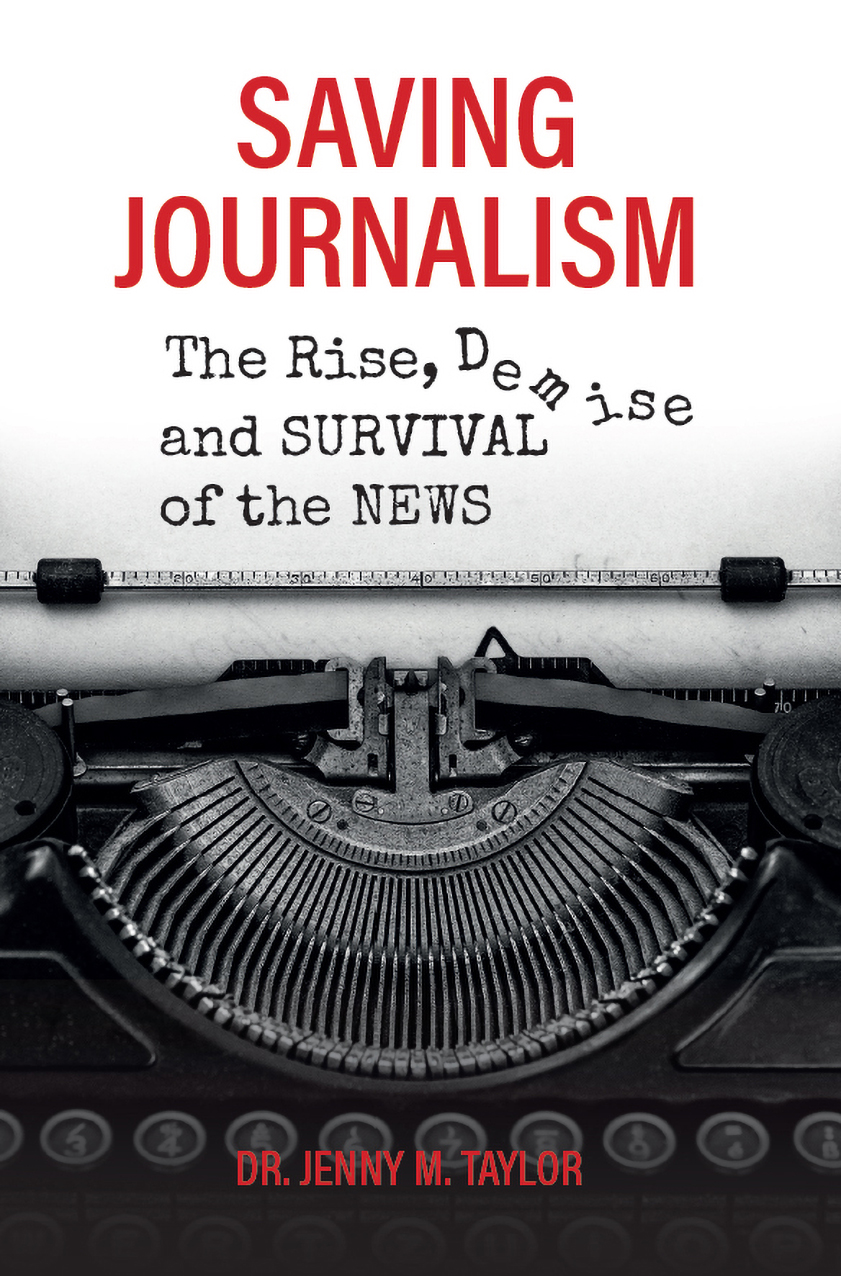 Dr. Taylor is convinced that journalists still have a vital role to play in reporting what Guardian editor Alan Rusbridger calls “stuff that matters”, and says Saving Journalism is having an effect even before its 2025 publication : “I have been asked to contribute to a course at the University of Central Lancashire devoted to the future of journalism, to share the methodology I used for my PhD on the sociology of religion at London ’s School of African and Oriental Studies(SOAS). As they say on the newsdesk, ‘Hold the front page’.”
Dr. Taylor is convinced that journalists still have a vital role to play in reporting what Guardian editor Alan Rusbridger calls “stuff that matters”, and says Saving Journalism is having an effect even before its 2025 publication : “I have been asked to contribute to a course at the University of Central Lancashire devoted to the future of journalism, to share the methodology I used for my PhD on the sociology of religion at London ’s School of African and Oriental Studies(SOAS). As they say on the newsdesk, ‘Hold the front page’.”
Keep in touch with the course at: www.uclan.ac.uk/postgraduate/courses/journalism-innovation-leadership-ma
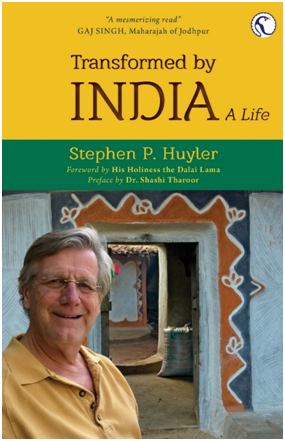 When Stephen Huyler, an American, was just twenty years old, he was invited to India by the legendary Kamaladevi Chattopadhyay. Through her guidance, Stephen conducted a lifetime survey of rural Indian arts and crafts. For the past 52 years, he has travelled through every district in peninsular India to photograph and record the arts of our people. Much of his long career has focused on women’s arts and identity.
When Stephen Huyler, an American, was just twenty years old, he was invited to India by the legendary Kamaladevi Chattopadhyay. Through her guidance, Stephen conducted a lifetime survey of rural Indian arts and crafts. For the past 52 years, he has travelled through every district in peninsular India to photograph and record the arts of our people. Much of his long career has focused on women’s arts and identity.
Stephen’s many books and museum exhibitions in India and overseas have brought direct attention to these often-ignored creative endeavors.
To introduce you to Transformed by India, a memoir arising from Stephen Huyler’s lifelong devotion to our country, what better than the Preface by that arch-communicator, Dr. Shashi Tharoor?
Before anything can be said about the journey you are going to embark on in this book, take a moment … and imagine different people going through the following experiences:
– travelling alone, at the age of 19, through Paris, Iran, Turkey, Pakistan, Afghanistan and India;
– on your twentieth birthday, pedalling a bicycle rickshaw through the Indian border;
– at that age, being mentored by the legendary Kamaladevi Chattopadhyaya;
– travelling all the way from the southern tip of India up the western coast, to the north;
– driving four months through all of central India in an offensively intrusive car.
But these are the experiences of just one person – Stephen Huyler – who knows how to recount them in the most vivid, thoughtful, and evocative way.
One of the most beautiful things about travelogues is their sense of adventure: you are always on the move, there is always something new to see, a unique experience to take in. Wordier travel writers can become monotonous and lose themselves in trying to describe what they see, rather than what they feel. Stephen does not suffer from this ailment. His book does a fabulous job of making sense of what he saw, deeply rooted in his dynamic approach to life. It is a travelogue that doubles up as a treasure trove of insight that ties Stephen so intimately to India – a country and a people that have made him their own.
India is a country of sparkling conversations and breathtaking landscapes; of startling social discoveries and homely surprises; of deep flaws and deeper successes. It is, indeed, an ever-ever land. Stephen has been blessed in experiencing it whole — almost in its entirety. In that sense his history is as much India’s as it is his own.
In my own writing, I have spoken of India as a country that is much more than the sum of its parts. When Stephen talks of being ‘transformed’ by India, he is both processing and discovering a country that escapes all conventional niches: you are delving into a vibrant account of a life of eclectic experiences, lived to the fullest.
Written with warmth, clarity, and candour, this fascinating memoir is one I think you will enjoy. I also anticipate that, as in my case, you will come out of the book valuing your own transformations that little bit more.
–xxx–
For your diary: It is already confirmed that Dr. Huyler, during his 2025 tour of India, will speak at Literature Festivals in Kolkata (January 21-25) and Hyderabad (25-28). He has also been invited to speak at Bengaluru’s Museum of Arts and Photography, on January the 30th at 6.30pm, as well as, on Friday 31st January 2025, in the Auditorium of the National Gallery of Modern Art, Mahatma Gandhi Road, Fort, Mumbai 1, at 5.30pm.
Please look out for further details of these, as well as announcement of additional opportunities, in Bengaluru, Mumbai & Delhi, to have your imagination excited by Stephen Huyler’s vibrant visuals and the moving and impactful story of his life.
There is a huge amount about our own country to be learnt from the decades of Dr Huyler’s sensitive and towering and contributions to our country, all of which were possible primarily because he has been welcomed and accepted by our nation.
A commemorative volume for the hundredth birth anniversary of the Father of Modern Indian Poetry, Nissim Ezekiel
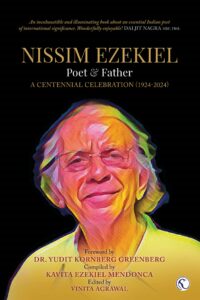 His daughter Kavita Ezekiel Mendonca, offers memoirs and poems by Adil Jussawalla, Gieve Patel, Jeet Thayil, Kamal Balsara-Bacha, Menka Shivdasani, Saleem Peeradina, Sudeep Sen and Sujatha Mathai, among others.
His daughter Kavita Ezekiel Mendonca, offers memoirs and poems by Adil Jussawalla, Gieve Patel, Jeet Thayil, Kamal Balsara-Bacha, Menka Shivdasani, Saleem Peeradina, Sudeep Sen and Sujatha Mathai, among others.
Daljit Nagra has called it an “inexhaustible and illuminating book about an essential Indian poet of international significance”.
Malashri Lal asks: “How does one write about a father who is an iconic figure in Indian poetry, a mentor to the next generation, and a person who showered love on a daughter he had named “Kavita” — the epitome of poetry?”
This commemorative volume blends personal narrative with public fame to present a collection of tributes, interviews, and poetry interspersed with photographs that allow the reader into a deeply moving story of genius and vulnerability.
It’s always fascinating when prominent writers present a bouquet to another author, and The Hindustan Times selected Kavita’s “festschrift” to Nissim Ezekiel as one of its three special reads in its “HT Picks” series, with the words, “A moving story of genius and vulnerability.”
And what a tantalising comparison is here, between Nissim Ezekiel and V. S. Naipaul in their strikingly different attitudes to Mother India.
VS Naipaul and Nissim Ezekiel clash over post-independence Indian identity
The debate around Naipaul’s An Area of Darkness was an important moment in post-colonial thought and Indian identity, says an article by Rishabh Kumar in Scroll.on, Oct 27, 2024.
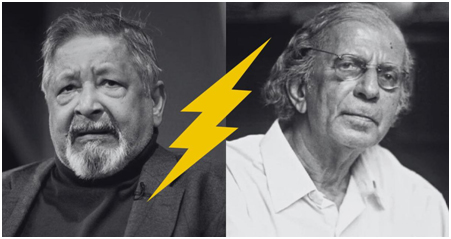
Perhaps Naipaul was searching for a land he knew only from his Brahmin grandfather’s stories and family traditions. So An Area of Darkness was part travelogue and part polemic, described by Kumar as “a searing, pessimistic indictment of the poverty, corruption, and false spirituality of his newly- independent homeland”.
Naipaul found neither the religious tone of his grandfather’s punditry, nor the mendicant pluralism of Gandhi, but an India that “was sad, simple and repetitive”. His return to his grandfather’s village was particularly striking: Naipaul wanted it to be the return of a long-lost son to the homeland his family had left under a harsh colonial regime. But he felt nothing: “I had learned my separateness from India, and was content to be a colonial, without a past, without ancestors.”
The book caused a literary furore: Westerners liked it, but it was banned by the Indian government, turning it into a milestone in post-colonial awareness.
It was Nissim Ezekiel, a founder of Indian English poetry, who wrote one of the strongest reactions in 1964, entitled “Naipaul’s India and Mine”, in Imprint magazine. Naipaul, never an Indian citizen, was always at odds with his Indian and Trinidadian past, and ultimately lived apart from both backgrounds in the UK. But Ezekiel, coming from an Indian Jewish family, lived entirely in Mumbai, even after many Indian Jews left for Israel. When Ezekiel wrote of India it conjured a sense of belonging, of cosmopolitan modernity; when Naipaul did, it stemmed from frustration with India’s failure to achieve the traditions he had heard when growing up.
Ezekiel wrote: “My quarrel with Mr Naipaul……… is not because of these condemnatory judgements of his, so fiercely, so blazingly expressed. My quarrel is that Mr Naipaul is so often uninvolved and unconcerned. He writes exclusively from the point of view of his own dilemma, his temperamental alienation from his mixed background, his choice and his escape.”
“I am not a Hindu and my background makes me a natural outsider…… A man can do something for and in his environment by being fully what he is, by not withdrawing from it. I have not withdrawn from India.”
You can read the whole fascinating debate at https://scroll.in/article/1074756/vs-naipaul-nissim-ezekiel-and-a-forgotten-literary-debate-on-post-independence-indian-identity
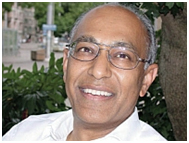
Quantum Technology & the Future
Prabhu Guptara’s Lecture Tour of the USA, in the following cities, in each case to a select invited audience:
Wed, Oct 23 Los Angeles, California
Th, Oct 24 San Francisco, California
Tues, Oct 29 Dallas, Texas
Wed, Oct 30 Nashville, Tennessee
Fri, Nov 1 New York, NY
Having surveyed the history of technology from ancient times, Prabhu asked why the knowledge behind those technologies had disappeared so completely, suggesting that:
- these technologies were for the benefit of the elite, and at the cost of the majority of the population; and
- the elite regarded knowledge as power, and therefore guarded it jealously, which meant that only a very few people had to die, from natural or human causes, for any technological secret to be lost.
It is worth thinking: What are the lessons from that for our own time?
Pointing out that the Protestant Reformation was key to understanding the rise of modern technologies, he surveyed its contributions to modern life, as a result of which a huge part of the world now has a lifestyle that would have been the envy of even emperors from the past. But no technology is neutral. All technologies magnify certain things and condense other things. There have been many enabling technologies in the recent past, but all those put together don’t match the impact that quantum computing is already having – and will have, even faster and hugely greater, in the immediate future. In just 5 years, quantum capability has arguably grown theoretically by 347.8 orders of magnitude – and certainly in reality by something like 100 times already. Applied just to manufacturing, the result is possibly prosperity at such a huge scale that material things lose value entirely (value is a function of demand vs supply, and if demand e.g. for food and clothes grows at say 5% a year in spite of a foreseeably collapsing world population, but availability of food and clothes is more or less infinite, then the conclusion for the price of food and clothes is obvious). What changes are needed in social and political and economic arrangements to enable us to transition peacefully to such unimaginable prosperity?
But, looking more mundanely at the problems facing our global reality, could we not say that these are:
- Debt out of control
- Unsustainable and Still Rising pay differentials and wealth inequality,
- Financial economy vs. real economy
- Unaccountable corporations
- Looming care crisis
- Family breakdown
- Generational inequality
- Managing the environmental crisis
Can Quantum technology help us with such real issues? The fact is that no technology is “neutral” – all technologies are both good *and* evil; technology is essentially a multiplier – of good as well as of evil. So can any kind of technology save us? NO, because humans have always used, and will always (if possible) use tech in evil ways; but also YES, to the degree that tech is used in good ways. In that case, can individuals (or individual companies) determine whether technology is used for good or ill? YES, at their own level; but NO at larger levels – e.g., the economy as a whole. And, in that case, at the level of the whole economy, what are the things that determine whether good uses of technology are encouraged – or evil uses of technology are discouraged?
The global economic and political structures behind our real crises take as their foundational assumptions the following basic untruths:
- People are individuals who are mainly decision-making units
- Money is the most effective measure of value
- Relationships are no more than political or economic connections.
If we rid ourselves of these untruths, and reform our global economic and political structures accordingly, technology will then stop performing the dual role of solving as well as magnifying problems, and start performing much more of a systemically positive role.
PLEASE NOTE THAT A FULLER REPORT IS AVAILABLE ON REQUEST
Books coming next
 The international edition (outside North America), of the sixth collection of poems by the Bene Israeli Indian poet, Zilka Joseph, which has had extensive coverage in the US press and media
The international edition (outside North America), of the sixth collection of poems by the Bene Israeli Indian poet, Zilka Joseph, which has had extensive coverage in the US press and media
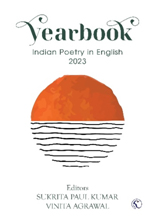 The fourth of the Yearbooks of Indian Poetry in English, carrying the best of the poetry published in magazines and books that year. Naturally, the Yearbook for each year can then be published only in the succeeding year – so the one for 2023 is published in 2024
The fourth of the Yearbooks of Indian Poetry in English, carrying the best of the poetry published in magazines and books that year. Naturally, the Yearbook for each year can then be published only in the succeeding year – so the one for 2023 is published in 2024
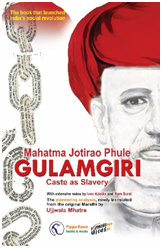 With a Foreword by Professor Dr. Kancha Ilaiah Shepherd. Now the most faithful available translation, from the original Marathi, of the classic which first demonstrated that Indian’s caste system is a system of slavery. Though the work of the Bengal Renaissance, and indeed of the earlier reformers (Jains, Buddhists, Siksh, Sufis, and missionaries), was foundational, it is Gulamgiri that started India’s widespread social revolution.
With a Foreword by Professor Dr. Kancha Ilaiah Shepherd. Now the most faithful available translation, from the original Marathi, of the classic which first demonstrated that Indian’s caste system is a system of slavery. Though the work of the Bengal Renaissance, and indeed of the earlier reformers (Jains, Buddhists, Siksh, Sufis, and missionaries), was foundational, it is Gulamgiri that started India’s widespread social revolution.